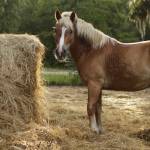Chromium Supplementation and Insulin Dynamics in Horses: Is There a Link?

Research shows that the mineral chromium enhances the action of insulin. Using this premise, some presume that this trace element could benefit horses and ponies suffering from insulin dysregulation.
“We know that increased blood sugar and insulin levels are associated with obesity and laminitis in horses and therefore pose major health risk for these animals,” said Kathleen Crandell, Ph.D., a nutritionist for Kentucky Equine Research.
Typical equine diets contain some chromium, but this may not be sufficient to support horses and ponies with insulin resistance. Veterinary researchers found that supplementing equine diets with 4 mg of chromium propionate daily can lower both glucose and insulin levels in the bloodstream after feeding a meal containing sugary concentrates.*
According to the researchers, “The improved insulin sensitivity in horses fed 4 mg of chromium after concentrate feeding suggests that the control diet was inadequate in chromium for maximizing insulin sensitivity.” They reported that hay and concentrate used in the study contained only 0.1-0.22 and 0.3 mg chromium/kg dry matter, respectively.
Crandell cautions readers that this research was conducted on normal healthy Quarter Horses with average body weights, not necessarily horses with insulin dysregulation. Thus, further research is needed to determine whether chromium supplementation may be effective in horses with insulin dysregulation.
“To date, the NRC does not have a recommended requirement for chromium due to a lack of sufficient information of the mineral in horses available at time of publication,” Crandell shared.**
Current management recommendations for horses with insulin dysregulation and equine metabolic syndrome include offering diets low in nonstructural carbohydrates (e.g., hay with less than 10% nonstructural carbohydrates or that has been steamed or soaked) and a regular exercise routine to help manage body weight.
“In addition, owners of insulin-resistant horses and ponies could offer a low-intake vitamin and mineral supplement, particularly if they are steaming or soaking hay and potentially leaching valuable vitamins and minerals from the hay,” Crandell recommended.
*Spears, J.W., K.E. Lloyd, P. Siciliano, S. Pratt-Phillips, E.W. Goertzen, S.J. McLeod, J. Moore, K. Krafka, J. Hyda, and W. Rounds. 2020. Chromium propionate increases insulin sensitivity in horses following oral and intravenous carbohydrate administration. Journal of Animal Science 98(4).
**National Research Council. 2007. Nutrient Requirements of Horses, 6th revised edition. The National Academies Press, Washington, D.C.








